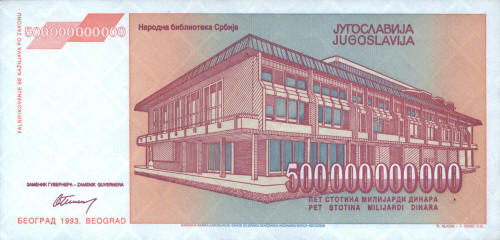
| "We wanted to proof that we could print money faster than the inflation run, but we even missed this one" |
11 zeros - how to become a billionaire! The value was about 6 Euros.
|
Impressions |
July 2005 |
Novac. This means "money" in Serbian, and Serbs have a special relation with it.
This does not seem something special, because everyone likes to have money and most want more of it. But in Serbia it has some special aspects. The first one is, that many Serbs have worked and lived abroad and earned hard currency. This was specifically possible when Tito was still alive and most of Central and Eastern Europe was locked away behind the Iron curtain.
| But then came the dissolution of the old Yugoslavia, war and inflation. Somehow, the government had to finance this. And this, the government usually does with the money of its people. As they did not want to give the money to the government, they spent it. This pushed prices, and so on. And money got changed into German marks, what the government did not like neither. So it happened on the black market, and this pushed the exchange rate. |
 |
|
|
11 zeros - how to become a billionaire! The value was about 6 Euros. |
Finally, the bank note with the highest value was 500 000 000 000 Dinar. But you could not buy much. A monthly salary corresponded to five Euro.
|
Finally there was a reform. Today, the money looses about 15 % annually in exchange value and inflation. Sometimes more, sometimes less. But the people count in Euro. If they get their salary, they immediately change it into Euro. |
|
Many prices and salaries are denominated in Euro, they are converted into Dinar in the last moment. If prices cannot be shown in Euro, they have to be adjusted quite often. And in many aspects prices are jumping, so if parking increases from 15 to 35 Dinar per hour. And those who have prices fixed in Dinars, eg. for gas or medicine, might not get enough money after some time. It happens very often that there are some shortages because the importers do not want to import as they do not recover their cost and they want to put pressure to get higher prices.
|
Electricity is paid in Dinar, but of course once a month. Rent we pay every three months - but in Euro. |
A few years ago when the Mark was changed to Euro, money was brought in by plane to supply the cash necessary. But at this moment the National bank got for once a clear idea how many foreign currency was circulating in the country - several billions.
| Today Serbia struggles to stabilize its own currency. Neighboring
Montenegro does not have this problem as they have the Euro (and before
the German Mark) as their national currency. There is no possibility for
the National bank to run their own policy, but also no problem with
stability. With the stabilization of the dinar came the bank reform. Half of the 80 Serbian banks have been closed. The others had to make huge corrections on their balance sheet. Foreign banks could get a license, and today many operate in Serbia, mostly Austrian and Greek banks. People like foreign banks as their money seems to be safer than with local banks. Some Serbian banks have been privatized and sold to foreign banks. They could be acquired for little money some time ago, now they prices are getting higher to buy some market share in the Serbian banking business. And with the new banks a new wave of credit came. |
|
People take loans because they see this as the only possibility to buy a new car, new furniture or to go on vacation. But when winter gets cold, the only heating possibility is electricity and the bills explodes, already some few thousand Euros of debt at 16 % interest become big trouble.
For some, a Serbian saying comes to late: "Ljubav za ljubav, i sir za pare" - Love for love, but cheese for money.
PS. According to the Statistics Office the average Serbian household earns
monthly 23 587 CSD (285 €) and spends 25 113 CSD (303 €).
(2.
Quarter 2005, Source: Executive Newsletter)